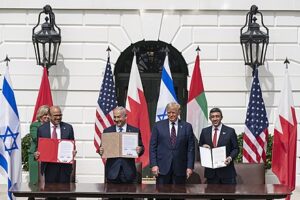Amid his unending attack on the democratic process, President Trump tweeted yesterday that “our two GREAT friends Israel and the Kingdom of Morocco have agreed to full diplomatic relations – a massive breakthrough for peace in the Middle East!”. The announcement of normalization between Israel and Morocco marks the fourth normalization agreement between Israel and an Arab nation this year. Hailed as one of Trump’s most significant foreign policy achievements, the normalization agreements have profound consequences for the Middle East and the United States’ role in the region.
Until 2020, the only two formal agreements between Israel and an Arab Nation were the Egypt–Israel Peace Treaty (1978) and the Israel–Jordan Peace Treaty (1994). These two agreements were momentous. Both agreements ended decades of military conflict and established the framework for future peace and normalization agreements. The Egypt-Israel Peace Treaty earned Egyptian Prime Minister Anwar Sadat and Israeli Prime Minister Menachem Begin Noble Peace Prizes, and the Israel-Jordan Peace Treaty is widely considered as the only successful agreement of the 1990s peace process. Although consequential, the peace treaties are “cold” agreements where full diplomatic and economic normalization has yet to materialize.
The recent normalization agreements between Israel and the UAE, Bahrain, Sudan, and Morocco are the first peace or normalization agreements between Israel and an Arab nation in over twenty years. Each agreement is unique in its formation and historical context; however, all agreements contain four similar elements. First, recognition of sovereignty. The agreements call for mutual recognition of sovereignty and thus legitimize the Israeli claim to statehood. Second, diplomatic and economic normalization. The agreements set up steps for diplomatic exchange and further economic cooperation. Third, security coordinaton. The agreements along with verbal commitments have promised increased security coordination to counter regional threats (e.g. Iran). Fourth, the Palestinian cause. Each agreement articulates a joint Israel-Arab commitment to Palestinian peace. The agreements pave the way for a more robust Israeli-Arab economic and political relationship.

Although Israel already maintained some sort of relationship with the UAE, Bahrain, Sudan, and Morocco before normalization, the agreements still have major implications for each nation and the region. The significance is threefold.
First, Iran. Iran has relied on the disunited nature of Israel, the United States, and the Arab nations to maintain influence in the region (e.g. Yemen, Syria, etc.). Effective coordination between Israel, the United States, and the Arab nations will significantly limit Khamenei’s influence in the region. The recent killings of Abu al-Masri and Mohsen Fakhrizadeh on Iranian soil are indicative of the growing willingness to directly interfere in Iranian affairs.
Second, Palestine. The recent normalization agreements have undermined the 2002 Arab Peace Initiative. The Arab Initiative promised comprehensive peace with the Arab world in exchange for (1) Israel’s complete withdrawal to the 1967 line, (2) a just resolution to the Palestinian refugee problem, and (3) the establishment of a sovereign Palestinian state with East Jerusalem as the capital. Arab states were forbidden from normalizing relations with Israel prior to a just resolution to the Israel-Palestinian conflict. The recent normalization agreements effectively nullify the conditional nature of the Peace Initiative. The Palestinian leadership now possesses significantly less negotiating power compared to before the normalization agreements.
Third, the United States. The normalization agreements allow for the United States to begin decreasing its involvement in the region. Contemporary US involvement in the Middle East is focused on countering Iran, preventing regional instability, and reducing terrorism. A joint Israeli-Arab partnership would be similarly committed to these goals. Israeli-Arab normalization offers the prospect of reduced American military involvement in the Middle East.
As the President of the United States continues his attack on America’s democratic institutions, Israel and Morocco will begin laying the foundation for diplomatic and economic normalization. Ultimately, these normalizations will likely transform the region by building a more robust Israeli-Arab partnership and lessening US military involvement in the Middle East.


Leave a Reply